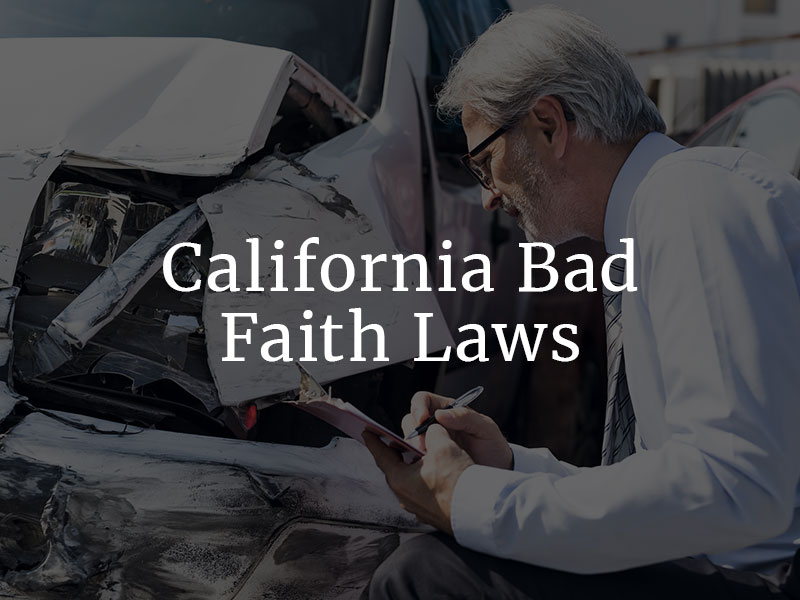Bad Faith Laws in California
Bad faith is negligence or intentional misconduct by an insurance provider, often resulting in losses to the client. Bad faith can cause a claimant significant financial strife. The State of California has laws in place to hold insurance companies accountable for failing to uphold the terms of a valid policy. These laws are complex and generally require an attorney to navigate them properly. Legal representation could help a claimant protect his or her rights according to California’s bad faith laws.

What Is Bad Faith in California?
California Insurance Code 1033 defines insurance bad faith as an insurance company acting unreasonably, or without proper cause, in the handling of a client or claim. When someone signs up for insurance, he or she makes a deal: the insurance company agrees to provide coverage according to the terms of the policy if the claimant pays a certain amount for the protection. An insurance company commits bad faith if it fails to fulfill the duties it owes a client based on the language of the policy.
- Interpreting the policy unreasonably
- Denying benefits the policy guarantees
- Misrepresenting facts during conversations with claimants
- Failing to fulfill the standards of a reasonable investigation
- Attempting to settle for an unreasonably low amount
- Delaying the payout of a settlement without a valid reason
- Threatening or coercing the claimant
- Telling the claimant not to hire a personal injury attorney
- Committing insurance fraud
Any unreasonable, unfair or criminal activity on the part of an insurance company during a claim could constitute bad faith. A policyholder may have a case of bad faith if an insurance company does not handle a claim fairly based on the terms of the contract. Holding an insurance company accountable for bad faith could force it to reevaluate the claim. It could also promote institutional changes within the insurance company to prevent future bad faith practices.
Types of Bad Faith Claims
The two main types of bad faith claims are first-party and third-party. A first-party bad faith claim involves an insurance company and its policyholder. A third-party claim involves a claimant that does not have a policy with the insurance company. A first-party claim may be appropriate if the claimant’s insurance provider refused to settle the claim or deal with it fairly. A third-party claim arises when an injured party tries to hold an at-fault party accountable for causing the injury.
Most first-party bad faith claims deal with breaches of contract. The insurance company may have acted outside the terms and conditions of its contract with a policyholder, giving grounds for a contractual dispute. Third-party claims deal instead with liability, or legal responsibility, for damages. A third-party claim asserts that the insurance company should be liable for the actions of its policyholder, who inflicted damage on the person filing the claim. Either type of bad faith claim may be necessary when an insurance company in California fails to fulfill its duties of care to claimants.
Damages Available in a Bad Faith Lawsuit
A civil bad faith lawsuit serves to reimburse the injured party, not to bring criminal charges against the insurance company. A successful bad faith lawsuit in California could force the insurance company to pay the claimant a financial award for damages.
- Good faith settlement for the original claim
- Interest on late payments
- Penalties and fines for breach of contract or fraud
- Legal fees and court costs
- Pain and suffering
- Punitive damages
Filing a bad faith claim against an insurance company in California could be the right course of action for a claimant who believes the insurer has not dealt with the claim according to the state’s rules and requirements. A bad faith claim may be the only way to obtain a financial award from an insurance company.

